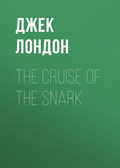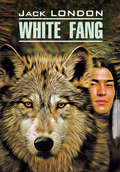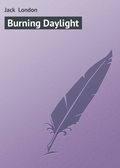
Джек Лондон
A Daughter of the Snows
CHAPTER XIV
"Ah, the salt water, Miss Welse, the strong salt water and the big waves and the heavy boats for smooth or rough – that I know. But the fresh water, and the little canoes, egg-shells, fairy bubbles; a big breath, a sigh, a heart-pulse too much, and pouf! over you go; not so, that I do not know." Baron Courbertin smiled self-commiseratingly and went on. "But it is delightful, magnificent. I have watched and envied. Some day I shall learn."
"It is not so difficult," St. Vincent interposed. "Is it, Miss Welse?
Just a sure and delicate poise of mind and body – "
"Like the tight-rope dancer?"
"Oh, you are incorrigible," Frona laughed. "I feel certain that you know as much about canoes as we."
"And you know? – a woman?" Cosmopolitan as the Frenchman was, the independence and ability for doing of the Yankee women were a perpetual wonder to him. "How?"
"When I was a very little girl, at Dyea, among the Indians. But next spring, after the river breaks, we'll give you your first lessons, Mr. St. Vincent and I. So you see, you will return to civilization with accomplishments. And you will surely love it."
"Under such charming tutorship," he murmured, gallantly. "But you, Mr. St. Vincent, do you think I shall be so successful that I may come to love it? Do you love it? – you, who stand always in the background, sparing of speech, inscrutable, as though able but unwilling to speak from out the eternal wisdom of a vast experience." The baron turned quickly to Frona. "We are old friends, did I not tell you? So I may, what you Americans call, josh with him. Is it not so, Mr. St. Vincent?"
Gregory nodded, and Frona said, "I am sure you met at the ends of the earth somewhere."
"Yokohama," St. Vincent cut in shortly; "eleven years ago, in cherry-blossom time. But Baron Courbertin does me an injustice, which stings, unhappily, because it is not true. I am afraid, when I get started, that I talk too much about myself."
"A martyr to your friends," Frona conciliated. "And such a teller of good tales that your friends cannot forbear imposing upon you."
"Then tell us a canoe story," the baron begged. "A good one! A – what you Yankees call – a hair-raiser!"
They drew up to Mrs. Schoville's fat wood-burning stove, and St. Vincent told of the great whirlpool in the Box Canyon, of the terrible corkscrew in the mane of the White Horse Rapids, and of his cowardly comrade, who, walking around, had left him to go through alone – nine years before when the Yukon was virgin.
Half an hour later Mrs. Schoville bustled in, with Corliss in her wake.
"That hill! The last of my breath!" she gasped, pulling off her mittens. "Never saw such luck!" she declared none the less vehemently the next moment.
"This play will never come off! I never shall be Mrs. Linden! How can I? Krogstad's gone on a stampede to Indian River, and no one knows when he'll be back! Krogstad" (to Corliss) "is Mr. Maybrick, you know. And Mrs. Alexander has the neuralgia and can't stir out. So there's no rehearsal to-day, that's flat!" She attitudinized dramatically: "'Yes, in my first terror! But a day has passed, and in that day I have seen incredible things in this house! Helmer must know everything! There must be an end to this unhappy secret! O Krogstad, you need me, and I – I need you,' and you are over on the Indian River making sour-dough bread, and I shall never see you more!"
They clapped their applause.
"My only reward for venturing out and keeping you all waiting was my meeting with this ridiculous fellow." She shoved Corliss forward. "Oh! you have not met! Baron Courbertin, Mr. Corliss. If you strike it rich, baron, I advise you to sell to Mr. Corliss. He has the money-bags of Croesus, and will buy anything so long as the title is good. And if you don't strike, sell anyway. He's a professional philanthropist, you know.
"But would you believe it!" (addressing the general group) "this ridiculous fellow kindly offered to see me up the hill and gossip along the way – gossip! though he refused point-blank to come in and watch the rehearsal. But when he found there wasn't to be any, he changed about like a weather-vane. So here he is, claiming to have been away to Miller Creek; but between ourselves there is no telling what dark deeds – "
"Dark deeds! Look!" Frona broke in, pointing to the tip of an amber mouth-piece which projected from Vance's outside breast-pocket. "A pipe! My congratulations."
She held out her hand and he shook good-humoredly.
"All Del's fault," he laughed. "When I go before the great white throne, it is he who shall stand forth and be responsible for that particular sin."
"An improvement, nevertheless," she argued. "All that is wanting is a good round swear-word now and again."
"Oh, I assure you I am not unlearned," he retorted. "No man can drive dogs else. I can swear from hell to breakfast, by damn, and back again, if you will permit me, to the last link of perdition. By the bones of Pharaoh and the blood of Judas, for instance, are fairly efficacious with a string of huskies; but the best of my dog-driving nomenclature, more's the pity, women cannot stand. I promise you, however, in spite of hell and high water – "
"Oh! Oh!" Mrs. Schoville screamed, thrusting her fingers into her ears.
"Madame," Baron Courbertin spoke up gravely, "it is a fact, a lamentable fact, that the dogs of the north are responsible for more men's souls than all other causes put together. Is it not so? I leave it to the gentlemen."
Both Corliss and St. Vincent solemnly agreed, and proceeded to detonate the lady by swapping heart-rending and apposite dog tales.
St. Vincent and the baron remained behind to take lunch with the Gold Commissioner's wife, leaving Frona and Corliss to go down the hill together. Silently consenting, as though to prolong the descent, they swerved to the right, cutting transversely the myriad foot-paths and sled roads which led down into the town. It was a mid-December day, clear and cold; and the hesitant high-noon sun, having laboriously dragged its pale orb up from behind the southern land-rim, balked at the great climb to the zenith, and began its shamefaced slide back beneath the earth. Its oblique rays refracted from the floating frost particles till the air was filled with glittering jewel-dust – resplendent, blazing, flashing light and fire, but cold as outer space.
They passed down through the scintillant, magical sheen, their moccasins rhythmically crunching the snow and their breaths wreathing mysteriously from their lips in sprayed opalescence. Neither spoke, nor cared to speak, so wonderful was it all. At their feet, under the great vault of heaven, a speck in the midst of the white vastness, huddled the golden city – puny and sordid, feebly protesting against immensity, man's challenge to the infinite!
Calls of men and cries of encouragement came sharply to them from close at hand, and they halted. There was an eager yelping, a scratching of feet, and a string of ice-rimed wolf-dogs, with hot-lolling tongues and dripping jaws, pulled up the slope and turned into the path ahead of them. On the sled, a long and narrow box of rough-sawed spruce told the nature of the freight. Two dog-drivers, a woman walking blindly, and a black-robed priest, made up the funeral cortege. A few paces farther on the dogs were again put against the steep, and with whine and shout and clatter the unheeding clay was hauled on and upward to its ice-hewn hillside chamber.
"A zone-conqueror," Frona broke voice.
Corliss found his thought following hers, and answered, "These battlers of frost and fighters of hunger! I can understand how the dominant races have come down out of the north to empire. Strong to venture, strong to endure, with infinite faith and infinite patience, is it to be wondered at?"
Frona glanced at him in eloquent silence.
"'We smote with our swords,'" he chanted; "'to me it was a joy like having my bright bride by me on the couch.' 'I have marched with my bloody sword, and the raven has followed me. Furiously we fought; the fire passed over the dwellings of men; we slept in the blood of those who kept the gates.'"
"But do you feel it, Vance?" she cried, her hand flashing out and resting on his arm.
"I begin to feel, I think. The north has taught me, is teaching me. The old thing's come back with new significance. Yet I do not know. It seems a tremendous egotism, a magnificent dream."
"But you are not a negro or a Mongol, nor are you descended from the negro or Mongol."
"Yes," he considered, "I am my father's son, and the line goes back to the sea-kings who never slept under the smoky rafters of a roof or drained the ale-horn by inhabited hearth. There must be a reason for the dead-status of the black, a reason for the Teuton spreading over the earth as no other race has ever spread. There must be something in race heredity, else I would not leap at the summons."
"A great race, Vance. Half of the earth its heritage, and all of the sea! And in threescore generations it has achieved it all – think of it! threescore generations! – and to-day it reaches out wider-armed than ever. The smiter and the destroyer among nations! the builder and the law-giver! Oh, Vance, my love is passionate, but God will forgive, for it is good. A great race, greatly conceived; and if to perish, greatly to perish! Don't you remember:
"'Trembles Yggdrasil's ash yet standing; groans that ancient tree, and the Jotun Loki is loosed. The shadows groan on the ways of Hel, until the fire of Surt has consumed the tree. Hrym steers from the east, the waters rise, the mundane snake is coiled in jotun-rage. The worm heats the water, and the eagle screams; the pale of beak tears carcases; the ship Naglfar is loosed. Surt from the south comes with flickering flame; shines from his sword the Val-god's sun.'"
Swaying there like a furred Valkyrie above the final carnage of men and gods, she touched his imagination, and the blood surged exultingly along unknown channels, thrilling and uplifting.
"'The stony hills are dashed together, the giantesses totter; men tread the path of Hel, and heaven is cloven. The sun darkens, earth in ocean sinks, fall from heaven the bright stars, fire's breath assails the all-nourishing tree, towering fire plays against heaven itself.'"
Outlined against the blazing air, her brows and lashes white with frost, the jewel-dust striking and washing against hair and face, and the south-sun lighting her with a great redness, the man saw her as the genius of the race. The traditions of the blood laid hold of him, and he felt strangely at one with the white-skinned, yellow-haired giants of the younger world. And as he looked upon her the mighty past rose before him, and the caverns of his being resounded with the shock and tumult of forgotten battles. With bellowing of storm-winds and crash of smoking North Sea waves, he saw the sharp-beaked fighting galleys, and the sea-flung Northmen, great-muscled, deep-chested, sprung from the elements, men of sword and sweep, marauders and scourgers of the warm south-lands! The din of twenty centuries of battle was roaring in his ear, and the clamor for return to type strong upon him. He seized her hands passionately.
"Be the bright bride by me, Frona! Be the bright bride by me on the couch!"
She started and looked down at him, questioningly. Then the import of it reached her and she involuntarily drew back. The sun shot a last failing flicker across the earth and vanished. The fire went out of the air, and the day darkened. Far above, the hearse-dogs howled mournfully.
"No," he interrupted, as words formed on her lips. "Do not speak. I know my answer, your answer.. now.. I was a fool.. Come, let us go down."
It was not until they had left the mountain behind them, crossed the flat, and come out on the river by the saw-mill, that the bustle and skurry of human life made it seem possible for them to speak. Corliss had walked with his eyes moodily bent to the ground; and Frona, with head erect and looking everywhere, stealing an occasional glance to his face. Where the road rose over the log run-way of the mill the footing was slippery, and catching at her to save her from falling, their eyes met.
"I – I am grieved," she hesitated. And then, in unconscious self-defence,
"It was so.. I had not expected it – just then."
"Else you would have prevented?" he asked, bitterly.
"Yes. I think I should have. I did not wish to give you pain – "
"Then you expected it, some time?"
"And feared it. But I had hoped.. I.. Vance, I did not come into the Klondike to get married. I liked you at the beginning, and I have liked you more and more, – never so much as to-day, – but – "
"But you had never looked upon me in the light of a possible husband – that is what you are trying to say."
As he spoke, he looked at her side-wise, and sharply; and when her eyes met his with the same old frankness, the thought of losing her maddened him.
"But I have," she answered at once. "I have looked upon you in that light, but somehow it was not convincing. Why, I do not know. There was so much I found to like in you, so much – "
He tried to stop her with a dissenting gesture, but she went on.
"So much to admire. There was all the warmth of friendship, and closer friendship, – a growing camaraderie, in fact; but nothing more. Though I did not wish more, I should have welcomed it had it come."
"As one welcomes the unwelcome guest."
"Why won't you help me, Vance, instead of making it harder? It is hard on you, surely, but do you imagine that I am enjoying it? I feel because of your pain, and, further, I know when I refuse a dear friend for a lover the dear friend goes from me. I do not part with friends lightly."
"I see; doubly bankrupt; friend and lover both. But they are easily replaced. I fancy I was half lost before I spoke. Had I remained silent, it would have been the same anyway. Time softens; new associations, new thoughts and faces; men with marvellous adventures – "
She stopped him abruptly.
"It is useless, Vance, no matter what you may say. I shall not quarrel with you. I can understand how you feel – "
"If I am quarrelsome, then I had better leave you." He halted suddenly, and she stood beside him. "Here comes Dave Harney. He will see you home. It's only a step."
"You are doing neither yourself nor me kindness." She spoke with final firmness. "I decline to consider this the end. We are too close to it to understand it fairly. You must come and see me when we are both calmer. I refuse to be treated in this fashion. It is childish of you." She shot a hasty glance at the approaching Eldorado king. "I do not think I deserve it at your hands. I refuse to lose you as a friend. And I insist that you come and see me, that things remain on the old footing."
He shook his head.
"Hello!" Dave Harney touched his cap and slowed down loose-jointedly.
"Sorry you didn't take my tip? Dogs gone up a dollar a pound since yesterday, and still a-whoopin'. Good-afternoon, Miss Frona, and Mr.
Corliss. Goin' my way?"
"Miss Welse is." Corliss touched the visor of his cap and half-turned on his heel.
"Where're you off to?" Dave demanded.
"Got an appointment," he lied.
"Remember," Frona called to him, "you must come and see me."
"Too busy, I'm afraid, just now. Good-by. So long, Dave."
"Jemimy!" Dave remarked, staring after him; "but he's a hustler. Always busy – with big things, too. Wonder why he didn't go in for dogs?"
CHAPTER XV
But Corliss did go back to see her, and before the day was out. A little bitter self-communion had not taken long to show him his childishness. The sting of loss was hard enough, but the thought, now they could be nothing to each other, that her last impressions of him should be bad, hurt almost as much, and in a way, even more. And further, putting all to the side, he was really ashamed. He had thought that he could have taken such a disappointment more manfully, especially since in advance he had not been at all sure of his footing.
So he called upon her, walked with her up to the Barracks, and on the way, with her help, managed to soften the awkwardness which the morning had left between them. He talked reasonably and meekly, which she countenanced, and would have apologized roundly had she not prevented him.
"Not the slightest bit of blame attaches to you," she said. "Had I been in your place, I should probably have done the same and behaved much more outrageously. For you were outrageous, you know."
"But had you been in my place, and I in yours," he answered, with a weak attempt at humor, "there would have been no need."
She smiled, glad that he was feeling less strongly about it.
"But, unhappily, our social wisdom does not permit such a reversal," he added, more with a desire to be saying something.
"Ah!" she laughed. "There's where my Jesuitism comes in. I can rise above our social wisdom."
"You don't mean to say, – that – ?"
"There, shocked as usual! No, I could not be so crude as to speak outright, but I might finesse, as you whist-players say. Accomplish the same end, only with greater delicacy. After all, a distinction without a difference."
"Could you?" he asked.
"I know I could, – if the occasion demanded. I am not one to let what I might deem life-happiness slip from me without a struggle. That" (judicially) "occurs only in books and among sentimentalists. As my father always says, I belong to the strugglers and fighters. That which appeared to me great and sacred, that would I battle for, though I brought heaven tumbling about my ears."
"You have made me very happy, Vance," she said at parting by the Barracks gates. "And things shall go along in the same old way. And mind, not a bit less of you than formerly; but, rather, much more."
But Corliss, after several perfunctory visits, forgot the way which led to Jacob Welse's home, and applied himself savagely to his work. He even had the hypocrisy, at times, to felicitate himself upon his escape, and to draw bleak fireside pictures of the dismal future which would have been had he and Frona incompatibly mated. But this was only at times. As a rule, the thought of her made him hungry, in a way akin to physical hunger; and the one thing he found to overcome it was hard work and plenty of it. But even then, what of trail and creek, and camp and survey, he could only get away from her in his waking hours. In his sleep he was ignobly conquered, and Del Bishop, who was with him much, studied his restlessness and gave a ready ear to his mumbled words.
The pocket-miner put two and two together, and made a correct induction from the different little things which came under his notice. But this did not require any great astuteness. The simple fact that he no longer called on Frona was sufficient evidence of an unprospering suit. But Del went a step farther, and drew the corollary that St. Vincent was the cause of it all. Several times he had seen the correspondent with Frona, going one place and another, and was duly incensed thereat.
"I'll fix 'm yet!" he muttered in camp one evening, over on Gold Bottom.
"Whom?" Corliss queried.
"Who? That newspaper man, that's who!"
"What for?"
"Aw – general principles. Why'n't you let me paste 'm that night at the Opera House?"
Corliss laughed at the recollection. "Why did you strike him, Del?"
"General principles," Del snapped back and shut up.
But Del Bishop, for all his punitive spirit, did not neglect the main chance, and on the return trip, when they came to the forks of Eldorado and Bonanza, he called a halt.
"Say, Corliss," he began at once, "d'you know what a hunch is?" His employer nodded his comprehension. "Well, I've got one. I ain't never asked favors of you before, but this once I want you to lay over here till to-morrow. Seems to me my fruit ranch is 'most in sight. I can damn near smell the oranges a-ripenin'."
"Certainly," Corliss agreed. "But better still, I'll run on down to Dawson, and you can come in when you've finished hunching."
"Say!" Del objected. "I said it was a hunch; and I want to ring you in on it, savve? You're all right, and you've learned a hell of a lot out of books. You're a regular high-roller when it comes to the laboratory, and all that; but it takes yours truly to get down and read the face of nature without spectacles. Now I've got a theory – "
Corliss threw up his hands in affected dismay, and the pocket-miner began to grow angry.
"That's right! Laugh! But it's built right up on your own pet theory of erosion and changed riverbeds. And I didn't pocket among the Mexicans two years for nothin'. Where d'you s'pose this Eldorado gold came from? – rough, and no signs of washin'? Eh? There's where you need your spectacles. Books have made you short-sighted. But never mind how. 'Tisn't exactly pockets, neither, but I know what I'm spelling about. I ain't been keepin' tab on traces for my health. I can tell you mining sharps more about the lay of Eldorado Creek in one minute than you could figure out in a month of Sundays. But never mind, no offence. You lay over with me till to-morrow, and you can buy a ranch 'longside of mine, sure." "Well, all right. I can rest up and look over my notes while you're hunting your ancient river-bed."
"Didn't I tell you it was a hunch?" Del reproachfully demanded.
"And haven't I agreed to stop over? What more do you want?"
"To give you a fruit ranch, that's what! Just to go with me and nose round a bit, that's all."
"I do not want any of your impossible fruit ranches. I'm tired and worried; can't you leave me alone? I think I am more than fair when I humor you to the extent of stopping over. You may waste your time nosing around, but I shall stay in camp. Understand?"
"Burn my body, but you're grateful! By the Jumpin' Methuselah, I'll quit my job in two minutes if you don't fire me. Me a-layin' 'wake nights and workin' up my theory, and calculatin' on lettin' you in, and you a-snorin' and Frona-this and Frona-that – "
"That'll do! Stop it!"
"The hell it will! If I didn't know more about gold-mining than you do about courtin' – "
Corliss sprang at him, but Del dodged to one side and put up his fists. Then he ducked a wild right and left swing and side-stepped his way into firmer footing on the hard trail.
"Hold on a moment," he cried, as Corliss made to come at him again.
"Just a second. If I lick you, will you come up the hillside with me?"
"Yes."
"And if I don't, you can fire me. That's fair. Come on."
Vance had no show whatever, as Del well knew, who played with him, feinting, attacking, retreating, dazzling, and disappearing every now and again out of his field of vision in a most exasperating way. As Vance speedily discovered, he possessed very little correlation between mind and body, and the next thing he discovered was that he was lying in the snow and slowly coming back to his senses.
"How – how did you do it?" he stammered to the pocket-miner, who had his head on his knee and was rubbing his forehead with snow.
"Oh, you'll do!" Del laughed, helping him limply to his feet. "You're the right stuff. I'll show you some time. You've got lots to learn yet what you won't find in books. But not now. We've got to wade in and make camp, then you're comin' up the hill with me."
"Hee! hee!" he chuckled later, as they fitted the pipe of the Yukon stove. "Slow sighted and short. Couldn't follow me, eh? But I'll show you some time, oh, I'll show you all right, all right!"
"Grab an axe an' come on," he commanded when the camp was completed.
He led the way up Eldorado, borrowed a pick, shovel, and pan at a cabin, and headed up among the benches near the mouth of French Creek. Vance, though feeling somewhat sore, was laughing at himself by this time and enjoying the situation. He exaggerated the humility with which he walked at the heel of his conqueror, while the extravagant servility which marked his obedience to his hired man made that individual grin.
"You'll do. You've got the makin's in you!" Del threw down the tools and scanned the run of the snow-surface carefully. "Here, take the axe, shinny up the hill, and lug me down some skookum dry wood."
By the time Corliss returned with the last load of wood, the pocket-miner had cleared away the snow and moss in divers spots, and formed, in general design, a rude cross.
"Cuttin' her both ways," he explained. "Mebbe I'll hit her here, or over there, or up above; but if there's anything in the hunch, this is the place. Bedrock dips in above, and it's deep there and most likely richer, but too much work. This is the rim of the bench. Can't be more'n a couple of feet down. All we want is indications; afterwards we can tap in from the side."
As he talked, he started fires here and there on the uncovered spaces. "But look here, Corliss, I want you to mind this ain't pocketin'. This is just plain ordinary 'prentice work; but pocketin'" – he straightened up his back and spoke reverently – "but pocketin' is the deepest science and the finest art. Delicate to a hair's-breadth, hand and eye true and steady as steel. When you've got to burn your pan blue-black twice a day, and out of a shovelful of gravel wash down to the one wee speck of flour gold, – why, that's washin', that's what it is. Tell you what, I'd sooner follow a pocket than eat."
"And you would sooner fight than do either." Bishop stopped to consider. He weighed himself with care equal to that of retaining the one wee speck of flour gold. "No, I wouldn't, neither. I'd take pocketin' in mine every time. It's as bad as dope; Corliss, sure. If it once gets a-hold of you, you're a goner. You'll never shake it. Look at me! And talk about pipe-dreams; they can't burn a candle 'longside of it."
He walked over and kicked one of the fires apart. Then he lifted the pick, and the steel point drove in and stopped with a metallic clang, as though brought up by solid cement.
"Ain't thawed two inches," he muttered, stooping down and groping with his fingers in the wet muck. The blades of last year's grass had been burned away, but he managed to gather up and tear away a handful of the roots.
"Hell!"
"What's the matter?" Corliss asked.
"Hell!" he repeated in a passionless way, knocking the dirt-covered roots against the pan.
Corliss went over and stooped to closer inspection. "Hold on!" he cried, picking up two or three grimy bits of dirt and rubbing them with his fingers. A bright yellow flashed forth.
"Hell!" the pocket-miner reiterated tonelessly. "First rattle out the box. Begins at the grass roots and goes all the way down."
Head turned to the side and up, eyes closed, nostrils distended and quivering, he rose suddenly to his feet and sniffed the air. Corliss looked up wonderingly.
"Huh!" the pocket-miner grunted. Then he drew a deep breath. "Can't you smell them oranges?"






